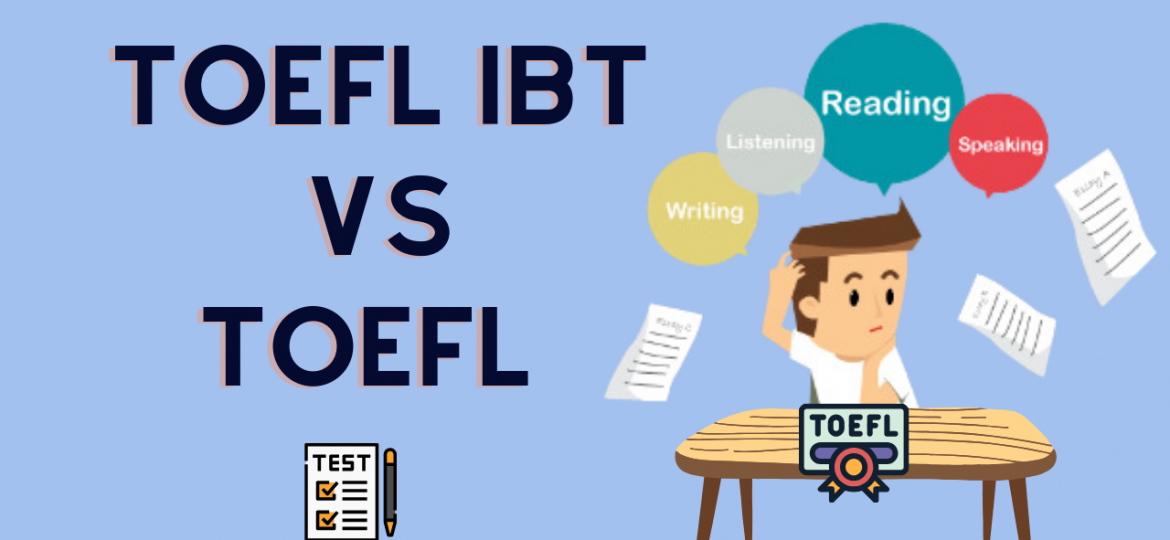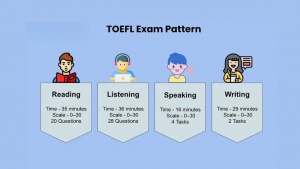
Understanding TOEFL and TOEFL iBT
In the realm of English language proficiency assessments, the acronyms TOEFL and TOEFL iBT stand out prominently. These tests are vital for non-native English speakers aiming to study or work in English-speaking countries. However, amid the sea of abbreviations and testing options, understanding the nuances between TOEFL and TOEFL iBT becomes paramount. In this comprehensive exploration, we delve into the distinctions between these two tests, offering insights into their formats, scoring systems, and suitability for test-takers.
TOEFL (Test of English as a Foreign Language): TOEFL, developed by ETS (Educational Testing Service), has been a staple in assessing English proficiency for decades. It primarily measures the ability of non-native English speakers to understand and use English at a university level. The test gauges proficiency in four key areas: Reading, Listening, Speaking, and Writing.
TOEFL iBT (Test of English as a Foreign Language, Internet-Based Test): TOEFL iBT is an updated version of the traditional TOEFL test. It is conducted entirely online and has gained prominence since its introduction due to its modern format and convenience. Like its predecessor, TOEFL iBT evaluates the same four skill areas: Reading, Listening, Speaking, and Writing. However, the delivery method and some aspects of the assessment differ.
Distinguishing Features TOEFL and TOEFL iBT
there is some features TOEFL Essentials and TOEFL IBT
- Format:
- TOEFL: The traditional TOEFL is a paper-based test, comprising multiple-choice questions and essay writing tasks. It is administered in test centers worldwide.
- TOEFL iBT: As the name suggests, TOEFL iBT is conducted over the internet. Test-takers interact with the test interface on a computer, which includes listening to audio recordings, reading passages, and typing responses.
- Speaking Section:
- TOEFL: In the traditional TOEFL, the Speaking section involves responding to recorded prompts, with responses recorded and evaluated by human raters.
- TOEFL iBT: The Speaking section in TOEFL iBT utilizes integrated tasks where test-takers listen to recordings and speak into a microphone, with responses digitally recorded and assessed by human raters.
- Writing Section:
- TOEFL: In the writing section of the traditional TOEFL, test-takers are required to write essays based on given prompts. These essays are handwritten.
- TOEFL iBT: TOEFL iBT also includes essay writing tasks; however, they are typed on a computer.
- Scoring:
- TOEFL: Scoring in the traditional TOEFL is done on a scale of 0 to 120, with each section (Reading, Listening, Speaking, Writing) scored separately.
- TOEFL iBT: Similarly, TOEFL iBT is scored on a scale of 0 to 120, with each section contributing to the overall score.
Read More: What is the Best Place to Study Abroad?
Choosing Between TOEFL iBT and TOEFL Essentials:
Now that we’ve examined the differences between TOEFL and TOEFL iBT , let’s delve into how to choose between these two tests. Making the right decision depends on several factors, including your proficiency level, your goals, and the requirements of the institutions or organizations you’re applying to.
Consider Your Proficiency Level
One of the primary factors to consider when choosing between TOEFL and TOEFL iBT is your proficiency level in English.
- TOEFL iBT: If you have a higher proficiency level and are comfortable with comprehensive assessments across reading, listening, speaking, and writing, TOEFL iBT might be the better choice. This test is designed for intermediate to advanced English speakers and offers a thorough evaluation of your language skills.
- TOEFL Essentials: On the other hand, if you’re just starting to learn English or are at the beginner or intermediate level, TOEFL Essentials might be more suitable. This test focuses on foundational language skills, making it ideal for individuals who are still developing their English proficiency.
Assess Your Goals
Your goals play a crucial role in determining which test is right for you. Consider what you plan to do with your English proficiency assessment and how the results will be used.
- TOEFL iBT: If your goal is to pursue higher education or professional opportunities in an English-speaking environment, TOEFL iBT is widely accepted by universities, employers, and immigration agencies worldwide. It’s the preferred choice for academic admissions and certain job requirements.
- TOEFL Essentials: If you’re primarily interested in demonstrating basic English proficiency for non-academic purposes, such as job applications or immigration requirements, TOEFL Essentials may suffice. This test provides a quick assessment of essential language skills without the extensive time commitment of TOEFL iBT.
Review Institution Requirements
Before making a decision, carefully review the requirements of the institutions or organizations you’re applying to. Some may specify which test they accept or have minimum score requirements.
- TOEFL iBT: Many universities and colleges require TOEFL iBT scores for admission, especially for programs conducted in English. Similarly, certain employers and immigration agencies may prefer or require TOEFL iBT scores for job applications or visa purposes.
- TOEFL Essentials: While TOEFL Essentials is a newer test and may not be as widely recognized as TOEFL iBT, it’s still accepted by some institutions and organizations. If the institutions you’re applying to accept TOEFL Essentials scores and you meet their minimum requirements, it could be a suitable option.
Evaluate Test Format and Content
Consider the format and content of each test and determine which aligns better with your strengths and preferences of TOEFL and TOEFL iBT .
- TOEFL iBT: If you’re comfortable with online testing and prefer a comprehensive assessment that includes speaking and writing tasks, TOEFL iBT may be the better choice. This test offers a holistic evaluation of your language skills and simulates real-world communication scenarios.
- TOEFL Essentials: On the other hand, if you prefer a shorter test with a focus on listening and reading skills, TOEFL Essentials might be more appealing. This test provides a quick snapshot of your foundational language abilities and may be less intimidating for some test-takers.
Seek Advice and Guidance
If you’re still unsure which test to choose, don’t hesitate to seek advice from teachers, advisors, or test preparation professionals. They can provide insights based on your specific circumstances and help you make an informed decision.
Advantages of TOEFL
- Familiarity: Some test-takers may prefer the traditional paper-based format of TOEFL, especially if they are more comfortable with pen and paper.
- Accessibility: TOEFL test centers are widely available worldwide, making it accessible to a broader range of candidates.
- Handwriting Practice: For individuals who wish to practice their handwriting skills, the traditional TOEFL provides an opportunity to do so in the writing section.
Advantages of TOEFL iBT
- Modern Format: TOEFL iBT reflects the increasing digitization of assessments and offers a more contemporary testing experience.
- Speaking Section: The integrated speaking tasks in TOEFL iBT provide a more comprehensive evaluation of speaking skills by assessing both listening and speaking abilities.
- Typing Convenience: Typing essays on a computer may be more convenient and efficient for many test-takers, eliminating concerns about legibility and allowing for easier editing.
Conclusion
In conclusion, both TOEFL and TOEFL iBT serve as essential tools for evaluating English language proficiency. While the traditional TOEFL maintains its relevance and popularity, the introduction of TOEFL iBT has offered a modernized alternative that aligns with the evolving landscape of digital assessments. Ultimately, the choice between the two tests depends on factors such as personal preference, test-taking experience, and the specific requirements of educational institutions or employers. Regardless of the option chosen, adequate preparation and familiarity with the test format are key to achieving success.
For further assistance or queries students can contact us, study abroad consultancy, and avail of our wide range of services for students on destinations like study in USA, study in Singapore, study in Switzerland, study in Australia, study in New Zealand, study in Germany, study in UK, study in Ireland and many other countries.
FAQ
What is TOEFL?
TOEFL stands for Test of English as a Foreign Language. It is a standardized test administered by the Educational Testing Service (ETS) to assess the English language proficiency of non-native speakers.
What is TOEFL iBT?
TOEFL iBT, or Test of English as a Foreign Language Internet-Based Test, is an updated version of the traditional TOEFL test. It is conducted entirely online and evaluates the same four skill areas: Reading, Listening, Speaking, and Writing.
What is TOEFL Essentials?
TOEFL Essentials is a newer addition to the TOEFL suite, introduced by ETS in 2021. It is designed to measure essential English language skills at the beginner and intermediate levels, focusing on listening and reading proficiency.
How do TOEFL and TOEFL iBT differ?
TOEFL iBT is a comprehensive test that assesses proficiency across reading, listening, speaking, and writing skills, while TOEFL Essentials focuses on foundational language skills, primarily listening and reading.
Which test should I take TOEFL and TOEFL iBT?
The choice between TOEFL Essentials and TOEFL iBT depends on factors such as your proficiency level, goals, institution requirements, and personal preferences. Consider whether you need a comprehensive assessment or a quick evaluation of essential language skills.




